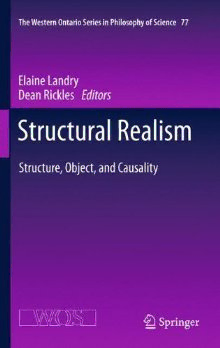
Structural Realism: Structure, Object, and Causality PDF
Preview Structural Realism: Structure, Object, and Causality
Structural Realism THEWESTERNONTARIOSERIES INPHILOSOPHYOFSCIENCE ASERIESOFBOOKSINPHILOSOPHYOFMATHEMATICSANDNATURALSCIENCE, HISTORYOFSCIENCE,HISTORYOFPHILOSOPHYOFSCIENCE,EPISTEMOLOGY, PHILOSOPHYOFCOGNITIVESCIENCE,GAMEANDDECISIONTHEORY ManagingEditor WILLIAMDEMOPOULOS DepartmentofPhilosophy,UniversityofWesternOntario,Canada DepartmentofLogicandPhilosophyofScience,UniversityofCalifornia/Irvine AssistantEditors DAVIDDEVIDI PhilosophyofMathematics,UniversityofWaterloo ROBERTDISALLE PhilosophyofPhysicsandHistoryandPhilosophyofScience, UniversityofWesternOntario WAYNEMYRVOLD FoundationsofPhysics,UniversityofWesternOntario EditorialBoard JOHNL.BELL,UniversityofWesternOntario YEMINABEN-MENAHEM,HebrewUniversityofJerusalem JEFFREYBUB,UniversityofMaryland PETERCLARK,St.AndrewsUniversity JACKCOPELAND,UniversityofCanterbury,NewZealand JANETFOLINA,MacalesterCollege MICHAELFRIEDMAN,StanfordUniversity CHRISTOPHERA.FUCHS,PerimeterInstituteforTheoreticalPhysics, Waterloo,Ontario MICHAELHALLETT,McGillUniversity WILLIAMHARPER,UniversityofWesternOntario CLIFFORDA.HOOKER,UniversityofNewcastle,Australia AUSONIOMARRAS,UniversityofWesternOntario JÜRGENMITTELSTRASS,UniversitätKonstanz THOMASUEBEL,UniversityofManchester VOLUME77 · Elaine M. Landry Dean P. Rickles Editors Structural Realism Structure, Object, and Causality 123 Editors ElaineM.Landry Dr.DeanP.Rickles UniversityofCalifornia UniversityofSydney DavisCalifornia UnitforHistory&PhilosophyofScience USA SydneyNewSouthWales [email protected] F07CarslawBldg. Australia [email protected] ISSN1566-659X ISBN978-94-007-2578-2 e-ISBN978-94-007-2579-9 DOI10.1007/978-94-007-2579-9 SpringerDordrechtHeidelbergLondonNewYork LibraryofCongressControlNumber:2011943742 (cid:2)c SpringerScience+BusinessMediaB.V.2012 Nopartofthisworkmaybereproduced,storedinaretrievalsystem,ortransmittedinanyformorby anymeans,electronic,mechanical,photocopying,microfilming,recordingorotherwise,withoutwritten permissionfromthePublisher,withtheexceptionofanymaterialsuppliedspecificallyforthepurpose ofbeingenteredandexecutedonacomputersystem,forexclusiveusebythepurchaserofthework. Printedonacid-freepaper SpringerispartofSpringerScience+BusinessMedia(www.springer.com) Preface Itstillseemsreasonabletoassumethatscientificrealism,insomeformorother,is themajoritypositionamongstbothpracticingscientistsandphilosophersofscience. However, as Jarrett Leplin quipped some years ago, realism is “[l]ike the Equal RightsMovement...amajoritypositionwhoseadvocatesaresodividedastoappear aminority”(ScientificRealism,UniversityofCaliforniaPress,1985,p.1).Within the broader church of scientific realism, structural realism too has splintered into many diverse denominations, often underpinned by quite distinct motivations and argued for using quite different defences. There is, then, no monolithic position known as ‘structural realism.’ But there is a general convergence on the idea that a central role is to be played by relational aspects over object-based aspects of ontology—whether this reflects a fundamental fact about the world (the ontolog- ical thesis)—as opposed to our engagement with it (the epistemological thesis)— introduces still further divisions. Still further divisions within these divisions are createdinthetaskofestablishingwhatisactuallymeantbyeachofthesetheses. Structural realism (if not quite labeled such) has been around in some form or othersinceatleastaslongagoasPoincaré’sfamouscommentaboutNaturehiding thetruenaturesofobjects,leavingusinsteadwiththeirtheirprojectionsintheform of structural shadows. Perhaps if we looked closely enough, we could find earlier versionsofit.Kant’stheoryofthedivisionbetweenphenomenaandnoumenacer- tainlycomesveryclosesincephenomenawill,bytheirverynature,involverelations (ifonlybetweenobserverandthequalitativepropertiesofasystem)asaninevitable consequence. However,inmorerecenttimes,largelythankstoitsintegrationwiththemesfrom the philosophy of physics (especially physical symmetries and group theory), it has evolved and broadened considerably from this earlier epistemological stance. Forexample,thepositionspawnedanontologicalversion,accordingtowhich‘the shadows’areallthatexistsatafundamentallevel.Whetherobjectscanbeentirely eliminatedfromone’sontology,infavourofaworldofpurestructure,isasubject ofcurrentdebate,andoneheavilydiscussedinseveralofthechaptersthatfollow. Thereiseven,thankstovanFraassen,ananti-realist(empiricist)counterpartto structural realism according to which one can agree with the structuralist aspects of structural realism but question the realist’s characterisation of science in terms v vi Preface of aim thesis having to do with “grasping” (in something like the correspondence sense)theunobservablepartsoftheworld,justasmuchastheobservableparts. Therehasalsobeensomemergingbetweenthediscussionsofstructureframed inthecontextofpuremathematicsandthosetakingplaceinthephysicalsciences. Still more recently, structural realism has been applied within the social sciences. However, with this expansion of the forms and applications of structural realism therehaveemergednewchallenges.Ithasreachedthestatusofamaturepositionin thephilosophyofscience.Buttherearelingeringissuesstemmingfromtheprecise characterisationofstructure,objects,andrelationsandtheinclusionofcausalityand modalityinstructuralrealistpositions. Howdowetalkaboutcausationinapurelystructuralworld?Objectsareusually viewed as the causes and the generators of change in the world; hence, given the structural realist’s prioritization of relations over objects it is natural to ask about how causality fits into structuralism. Does the structural realist’s world have suffi- cient resources to provide an adequate account of causal relations, or are objects a necessary condition of an adequate account of causation? What about deeper modal aspects of the world, as bundled into the concept of a law of Nature? Can suchnecessitysuperveneonanontologyofpurestructure?Thisbookisaboutthese intertwinedaspects,onthepreliminarytaskofgettingcleareronjustwhatstructural realistsmeanbystructure,andhowitrelatestotheobjectsthatarepartofourfolk ontology. Thebookisorganizedintothreeparts(thoughwithmuchthematicoverlapping amongstthem): • PartIexaminesthevariousframeworks(syntacticversussemantic)for,andthe variousinterpretations(epistemicversusonticversusmethodological)of,struc- turalrealism,inadditiontosomeofthestandardmotivationsunderlyingthese. • PartIIcriticallyexaminesthedifferingframeworks,interpretations,andmotiva- tionsofstructuralrealismandexaminestheirimpactonwhatscientifictheories sayaboutthenatureofobjectsandrelations(andviceversa). • PartIIIprobestheissueofwhatcanbesaidaboutwhatconceptionofobject(if any)isneededtounderwritetheconceptofacausallyconnected,law-governed world. This map corresponds roughly to the themed sessions of a 2007 workshop from which most of the chapters were drawn. However, in their conversion from talks to chapters, they have been significantly revised and updated and, we think, offer a faithful reflection of the current state of the art with respect to the problems and prospectsofstructuralrealism. Acknowledgements Thecontributionstothisvolumegrewoutofaworkshoponstructuralrealismheld in Banff, Canada, August 28–30, in 2007. We are grateful to the Social Sciences and Humanities Research Council of Canada, the International Collaboration on Complex Interventions, and the University of Calgary for generous financial sup- port for this workshop. Dean Rickles would like to thank the Australian Research CouncilforfundingtheAustralianResearchFellowshipunderwhichthisbookwas completed. vii Contents PartI FrameworksforStructuralRealism 1 ThePresentationofObjectsandtheRepresentationofStructure .... 3 StevenFrench 2 MethodologicalStructuralRealism............................... 29 ElaineM.Landry 3 HowNottoBeaRealist......................................... 59 IoannisVotsis 4 MiraclesandStructuralRealism................................. 77 JohnWorrall PartII StructuralRealismandtheNatureofObjectsandRelations 5 UnderdeterminationasaPathtoStructuralRealism ............... 99 KatherineBradingandAlexanderSkiles 6 KindsofObjectsandVarietiesofProperties ......................117 AntigoneM.Nounou 7 Time,Observables,andStructure................................135 DeanP.Rickles PartIII ModalityandCausalityinStructuralRealism 8 OnticStructuralRealismandModality...........................149 NoraBerenstainandJamesLadyman 9 AddingModalitytoOnticStructuralism:AnExploration andCritique...................................................169 StathisPsillos ix
